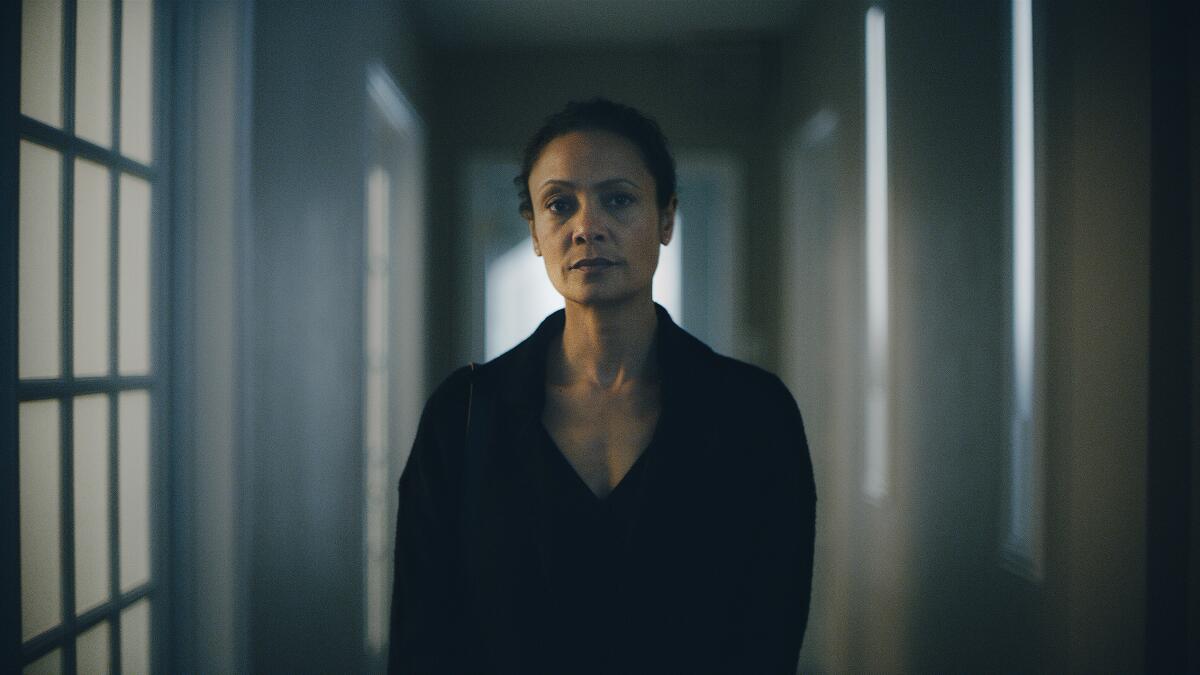Review: In ‘God’s Country,’ Thandiwe Newton strikes back against broken systems

- Share via
In Julian Higgins’ arresting, slow-burn thriller “God’s Country,” systems and people in positions of power meant to protect are the ones causing the harshest harm. A former New Orleans cop turned college professor, the unflinchingly outspoken Sandra (Thandiwe Newton) is on the receiving end of a dangerous torrent, left unchecked by the local authorities, that begins when two white men in a red truck illegally park on her secluded Montana property to hunt deer. What erupts from this boundary breaching are bursts of lingering grief, hovering microaggressions and outright systematic racism — pushing an unmoored Sandra toward a haunting and cathartic confrontation with long-buried wounds.
“They let my people drown,” Sandra tells the town’s acting sheriff, Wolf (Jeremy Bobb). She moved with her mother to this rugged, snowy countryside — evocatively captured in all its impassive danger by cinematographer Andrew Wheeler — to escape the trauma wrought from the American government leaving mainly African American citizens to languish in the Superdome following Hurricane Katrina. The incident disillusioned Sandra from ever wearing a badge again. If she couldn’t protect other Black folks, then how could she hope to safeguard her mother? And how do you participate in an institution that’s already proven to be broken? No matter how far Sandra runs, she can’t protect herself from America’s inherent racial inequities.
They affect her in visibly searing ways. The film opens with Sandra having her deceased mother cremated. It’s implied that her mom was never the same emotionally or psychologically following Katrina, making her a long-tail casualty of the devastating natural disaster. In the darkness of the unforgiving night, murmuring memories of flood waters invade Sandra’s nightmares. When it’s time to submit a list of candidates to her school’s dean for employment, her fellow (white) professors refuse to promise the inclusion of at least one person of color (they’d rather have exclusion than a dreaded “quota” system). And she discovers that an instructor is sexually harrassing a teacher’s assistant without any hint of repercussions coming his way.
So when these two white male hunters — a brawny yet sensitive Nathan (Joris Jarsky) and an innately vicious Samuel (Jefferson White) — trespass on her land, she is infuriated when the sheriff is not only incapable of protecting her property but is deferential to the men and critical of Sandra for escalating the situation. Emboldened, the two men continue to ignore Sandra’s wishes for them to respect her limits. Over the course of seven days, the disparate, hostile parties engage in intimidation to quell each other but only further escalate their passive-aggressive skirmishes.
The Sundance premiere of a film about a Black woman confronting white hunters on her property explores timely themes of race and gender.
It’s fascinating to see the intricate path Newton takes from cheerful academic to an intense woman on the edge. For the actress, it’s all in the eyes. They can turn mournful, gentle, dangerous — matching a physicality that barely betrays her deliberately hidden interior emotions. Within Sandra, Newton braids every thread of generational trauma into a lived-in symbol of defiance and anger.
One wishes the film better enfolded Indigenous culture within the narrative: While we do see a few hints, what’s given is not enough. And Nathan’s actions receive too little grounding to make sense.
Still, the final bloodletting, when Sandra finally faces her tormentors, is potent and disturbing. “God’s Country” is a film that wants to disarm you at every turn, and it often succeeds with a transfixing, acute spirit of retribution against society’s toxic racial and gender power dynamics.
'God's Country'
Rating: R, for language
Running time: 1 hour, 43 minutes
Playing: In general release; available on demand Oct. 4
More to Read
Only good movies
Get the Indie Focus newsletter, Mark Olsen's weekly guide to the world of cinema.
You may occasionally receive promotional content from the Los Angeles Times.











